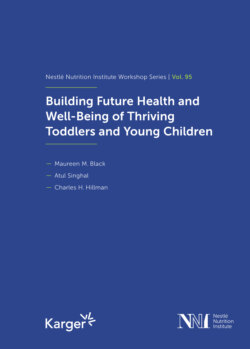Читать книгу Building Future Health and Well-Being of Thriving Toddlers and Young Children - Группа авторов - Страница 8
На сайте Литреса книга снята с продажи.
ОглавлениеPublished online: December 3, 2020
Black MM, Singhal A, Hillman CH (eds): Building Future Health and Well-Being of Thriving Toddlers and Young Children. Nestlé Nutr Inst Workshop Ser. Basel, Karger, 2020, vol 95, pp X–XI (DOI: 10.1159/000511523)
Foreword
According to the World Health Organization, the early child period, i.e., from birth to 5 years of age, is considered the most important developmental phase throughout the lifespan.
This period of a child’s life is fundamental in building the foundation for physical growth, development, health, and social and emotional skills. In fact, the first 3 years of life, which include a good portion of toddlerhood, shapes a child’s brain structure in preparation for lifelong learning. The development of fine motor skills, language, and social and behavior skills are all categories that children, particularly toddlers, are seeking to master.
As it was stated in the 2018 Global Nutrition Report, although the number of children who are stunted decreased, millions of children are still affected by stunting and wasting (150.8 million [22.2%] and 50.5 million children under 5 years of age, respectively), while the number of children who are overweight is steadily rising (38.3 million children under 5 years of age). In such significant disparities, appropriate nutrition, stable, responsive, and nurturing caregiving, as well as safe and supportive environments are the 3 critical elements of healthy child development.
The 95th Nestle Nutrition Institute Workshop Building Future Health and Well-Being in Thriving Toddlers and Young Children, was the first NNI Workshop presented 100% virtually, and explored in some detail the current scientific research, challenges, and opportunities of cementing a healthy foundation for life in toddlers and young children.
The program brought together three outstanding experts in the areas of health care, public health, and developmental science. The first session, chaired by Prof. Atul Singhal (University College London), focused on the nutritional challenges in toddlers and young children across the globe, such as nutrient deficiencies as well as overweight/obesity, which can be especially detrimental during an important period of child development and growth. The theme of the second session, led by Prof. Maureen M. Black (RTI International and University of Maryland School of Medicine), elucidated the journey from infancy to toddlerhood and the role of nutrition in it. A large focus of the scientific debates was also given to social aspects, i.e., responsive, responsible, and nurturing caregiving.
The third session of the workshop on health behavior and the developing brain aimed to explain the steps of motor skill development and the role of physical activities and nutrition in cognitive development and learning abilities of a child. This session, chaired by Prof. Charles H. Hillman (Center for Cognitive and Brain Health – Northeastern University), concluded this fascinating scientific forum.
The key issues provided by this 3-day workshop offer valuable insights for health care providers, policy makers, and researchers on how appropriate nutrition, nurturing caregiving, and environment can influence the development and health of children up to 5 years of age.
We gratefully acknowledge the three Chairpersons Atul Singhal, Maureen M. Black, and Charles H. Hillman, who assembled this outstanding scientific program. We would also like to thank all speakers and experts in the audience who have contributed to the content of the workshop and scientific discussions.
Finally, we express our gratitude to Dr. Tamara Lazarini, her team in Brazil, and the Nestlé Nutrition Institute team in Switzerland for their efforts to make this workshop happen during this challenging time of a world pandemic.
Dr. Natalia Wagemans
Global Head, Nestlé Nutrition Institute
Vevey, Switzerland
